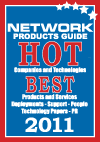Today, Rainer Enders, VPN expert and CTO of Americas at NCP engineering, addresses how IT and data management executives can properly protect their corporate data.
Q: What are the most effective steps IT and data management executives need to take in ensuring the best security for corporate information?
Rainer Enders: There is no substitute for best-of-breed security solutions. IT managers must realize that only betting on one vendor for all security needs will leave security holes in the architecture. A key starting point is the assessment of risk and exposure. For example, if you do not have employees working outside the office, you’ll have far different security implications than if you have a large mobile workforce. Obviously, the cost of the solution must match the assets at risk that will be insured and protected against damage or loss. A clear and concise security policy must be established that involves all the key stakeholders, and the policy must then be implemented and enforced at all levels. This is probably the most important and, sadly, the least followed advice.
Another trap many IT managers fall into is changing security infrastructure too quickly. Rather then taking a blended migration approach, a rip-out-and-replace approach is usually implemented, neglecting benefits and merits of existing incumbent security technologies. This has happened when SSL VPN was introduced to replace IPsec VPN. Customers followed early promises, only to see many companies now returning to the “old” IPsec VPN or adopting a hybrid approach, which would have served them better from the start. So any security architecture framework should follow the technology, not a vendor product roadmap.
If you have any questions on VPNs or anything else related to secure remote access, send them to editor@vpnhaus.com.
Rainer Enders is CTO, Americas, at NCP engineering.






February Feature of the Month: Integrated Support for 3G / LTE Cards, Part Two
Posted: February 21, 2013 in Industry Commentary, IPsec, IT policy, Mobile, VPN, Wi-FiTags: 3G, IPsec, mobile, Mobile Security, seamless roaming, VPNs, Wi-Fi
This is Part Two of our February Feature of the Month series. Last week, we honored the all-new Access Point Name (APN) feature in NCP’s entry and enterprise IPsec VPN clients.
Enterprises today are facing significant challenges related to remote computing due to their increasingly fragmented geographies. For instance, companies are not only contending with how to enable automated roaming between their solutions on premises and remote hotspots, but they are also responsible for making sure this seamless roaming is secure for employees working off-site.
To meet these industry needs, NCP engineering has enhanced its client suite to support integrated 3G cards, which ensure secure network connections for mobile workers when used in conjunction with the NCP Secure Enterprise VPN Server. NCP has combined 3G / 4G and VPN connection setup into a single, graphical user interface, simplifying the installation and deployment processes for both IT personnel and individual users.
Additionally, the NCP Secure Enterprise Client allows devices to automatically transition between a variety of communication mediums, including Wi-Fi, xDSL, LAN, ISDN and WWAN, making it easy for users to connect to their corporate networks from any location. Since the solution dynamically redirects the VPN tunnel without disrupting mobile computing sessions, employees are guaranteed uninterrupted connections to their networks.
Beyond that, for enhanced protection, the solution automatically recognizes secure and insecure networks to connect to while users are roaming. With its Friendly Net Detection feature, the IPsec VPN client then activates the appropriate firewall and security policies without the end user needing to lift a finger.
Want to learn more about the NCP Secure Enterprise Client’s integrated support of 3G / LTE cards? Additional information can be found here.
Share this: